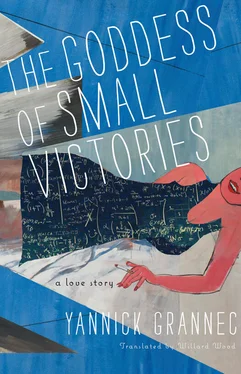“You’re very thoughtful, young lady.”
“I was thinking of the Gaussian curve. It’s a representation of the statistical mean.”
“You’re not going to start talking to me about mathematics, are you?”
“It shows that the features of a set’s elements tend to be distributed along a bell-shaped curve. The average values form the bump, the majority. The higher and lower values, by contrast, are relatively fewer in number. Like the distribution of IQ in a given population.”
“I’ve sat through my share of discussions of this kind.”
“You’ve broken beyond Gauss’s law, Adele. Beyond normal law. You’ve had an exceptional fate.”
“As I’ve already told you, Anna, every gift comes with a price.”
If people do not believe that mathematics is simple, it is only because they do not realize how complicated life is.
— John von Neumann
Halfway up the hill to the cemetery, I felt my stocking slither down my leg. Readjusting it, I caught a snag. I was late. I would arrive in front of his mother disheveled and sweating after I’d wasted my time picking out the right clothes for our meeting. I didn’t have much to lose, but I was still nervous. If she’d decided to put an end to our affair, why hadn’t she laid down the law to Kurt before leaving Vienna and returning to Brno? Before finally allowing us our chance to live together.
So what did she want from me? She openly suspected me of having a child hidden somewhere, as Kurt had confessed. This I found particularly galling. She couldn’t accuse me of having designs on the family fortune at this stage, the crash having made precarious inroads on their wealth. The older brother, Rudolf, a radiologist in Vienna, was the Gödels’ real source of financial support. Kurt was still a long way from earning enough for our needs, even if I’d always managed to get by on very little. She must have realized that I now belonged within the family circle, whether the issue was Kurt’s multiple relapses or her own run-ins with authority. About Marianne’s courage, at least, I was not in any doubt: she broadcast her disgust for the Nazis loud and clear, with total disregard for caution.
Her card arrived out of the blue: Frau Marianne Gödel wished to speak to me, in private, in a quiet place. In plain speech, she wanted to see me without Kurt. I had never previously had the honor of meeting her, though Kurt and I had been together for ten years. I sent her a letter in reply, which I drafted and redrafted a dozen times, proposing that we meet at the Café Sacher, next to the opera house — this was intended as an allusion to her love of music and as a gesture of goodwill. She returned a curt note saying that she would require a quieter setting. Most likely she didn’t want to be seen in public with me. I suggested the Grinzing cemetery instead, near the grave of Gustav Mahler.
This irony was not calculated to put her in a good mood, and I expected no less from her. She had refused point-blank to visit our house. I had held out to her the advantage of seeing her son’s cozy living arrangements in Grinzing firsthand. We lived right next to the last stop on the 38 line, so Kurt only had to catch the tram below the university to make the commute home. All the greenery was good for his health. The celebrated Dr. Freud had a country house in this quiet suburb — we were in respectable company. My grudges against her had been accumulating for some time, but the temptation to meet the liebe Mama with all her many talents — incomparable hostess, accomplished musician, attentive mother — was irresistible.
She waited, stiff and forbidding, by the gray marble gravestone. With no word of greeting, she inspected me from headstall to hooves.
“Mahler’s daughter, who died at the age of five, is buried with him.”
“Would you feel more comfortable sitting? There is a bench on the other side of the alley.”
She swept away my suggestion with an imperial gesture.
“You don’t understand maternal anxiety, Fräulein. When Kurt was eight, I believed I would lose him to rheumatic fever. Not a minute has passed since his birth that I have not been afraid for him.”
Since I could not claim this experience myself, the contest went to her. She made the most of it. I stifled my mounting anger.
“Kurt has always been very attached to me. Do you know that when he was five, my son howled and rolled on the ground when I left the room?”
I bit my tongue. As a distraction from the painful introduction, I examined the woman closely. In any case, she hadn’t called me there simply to give an account of her motherhood — it was a postulate of her system, as Kurt would have said.
I had met Rudolf, who was elegant and had piercing, light-colored eyes and a small, sweet bald spot. Marianne I had never seen before, even in a photograph. I searched the features of the goddess-mother for the traits I loved in my man. She was fiftyish. Her inquisitor’s eyes were hooded behind drooping lids. Her gaze was at once startled and vigilant, and of frightening and unmistakable intelligence. The waking double of her son’s sleepwalking gaze. Her mouth was still beautiful, though the corners sagged with bitterness. Unless she’d been born with this hermetic smile. She seemed wary rather than disagreeable, corseted by her middle-class education and the very high idea she held of her progeny’s fate. The nose was perhaps the one feature they shared.
“Princeton has again made my son a very interesting offer. He declined several earlier proposals. This one is exceptional, but, regrettably, he refuses to leave you. The atmosphere in Vienna is very disturbing to him. You should persuade him to emigrate, taking you with him if need be.”
“Why should I? My family is here. Our life is here.”
“You are terribly naïve. Italy will abandon Austria, it is only a matter of months. This city will become a madhouse and the Germans will be welcomed with open arms. You must leave. And quickly!”
“We are not Jews, nor are we Communists. We have nothing to fear.”
“Everyone should be afraid of the Germans. How can I let my son pay allegiance to the Nazis and give instruction to a band of barbarians? All his Jewish friends have left the country. Without them, he can do nothing worthwhile. No scientist or artist worthy of the name will accept the Nazis’ authority. As far as I’m concerned, Vienna is already dead.”
“Why would I do that? Before your letter, I didn’t even exist for you.”
“Kurt hates conflict. He is weak, he will never marry you without my consent. You’re not that young, and I might still live a long time.”
I did not rise to the bait.
“Then you are hiring me as a sort of nurse?”
“In a manner of speaking. Your wages will take the form of respectability and stability.”
“ ‘Respectability’ is a word that I long ago made up my mind to forget. And as for stability, Kurt is fragile, as you well know.”
“It is the reverse side of his gift. Fräulein, you don’t seem to realize the great opportunity before you. My son is an exceptional person. We noticed marks of genius in him from an early age.”
Here was the beginning of the catalog of praises I had been expecting all along. The church tower seconded my thought by emitting a few opportune peals.
“Do you know the difference between a person with talent and a genius? Work, Fräulein, a great deal of work. He needs peace and quiet to fulfill his destiny. Up till now you have been a hindrance to his success in academia. That must change.”
“It isn’t true!”
She contorted the dry flesh of her mouth into a disdainful grimace.
“I have a few recommendations for you. Hold your tongue until I am done, if that lies within your powers.”
Читать дальше












